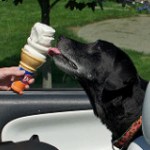genetic
Image from Pete Markham via Flickr Creative Commons (https://flic.kr/p/8ctqVC)
Researchers at the University of Cambridge in Britain recently studied 'willpower' in pet Labrador retrievers. After allowing each dog to smell a hot dog, the researchers placed the hot dog in a hamster cage and sealed it shut with duct tape. While some dogs showed only mild interest in the sealed-up hot dog, others were fixated on the out-of-reach treat. One dog, named Ash, broke apart the contraption to obtain the treat. This is interesting because although Ash is not obese or overweight, he…
The August Krogh Distinguished lecture was awarded to Dr. Warren Burggren, who gave a fantastic lecture on epigenetics, or modifications to gene expression. He discussed how epigenetic changes to our genes are reversible. So when a stimulus like hypoxia changes our genes, these epigenetic changes to the genes go away rather quickly when the hypoxic insult is gone, which contrasts genetic mutations that arise from modifications to the genetic code leading to relatively permanent changes.
"Drosophila melanogaster - side (aka)" by André Karwath aka Aka - Own work. Licensed under CC BY-SA 2.5 via Wikimedia Commons -
Researchers at the University of California at San Diego were interested in understanding how exposure to low oxygen concentrations impact heart function. For humans low oxygen delivery to the heart can occur with exposure to high altitude, respiratory diseases, inflammation, blood clots and during a heart attack when there is inadequate blood flow to the heart muscle. The results of their study were recently published in the American Journal…
Over the last several months, a lot of great books on fossils and evolution (as in paleontology) have come out. I've selected the best for your consideration. These are great gifts for your favorite science-loving nephew, life science teaching cousin, or local school library. Actually, you might like some of these yourself.
Let's start off with a kid's book: Grandmother Fish: a child's first book of Evolution by Jonathan Tweet.
From the blurb:
Grandmother Fish is the first book to teach evolution to preschoolers. While listening to the story, the child mimics the motions and sounds of our…
Social insects like ants, bees and wasps are some of the most successful animals on the planet. By acting as large super-organisms, they can achieve things that larger singular creatures cannot.
Their astounding selflessness is driven by an unusual way of handing down their genes, which means that females actually have more genes in common with their sisters than they do with their own daughters. And that makes them more likely to put the good of their colony sisters over their own reproductive legacy.
The more related the workers are to each other, the more willing they will be to co-…
Students and laypeople alike often view biotech patents with baffled disbelief. How is it possible to patent bacteria? Mice? Cell types and DNA sequences? How can someone else "own" gene sequences that all of us have carried inside our bodies since birth?
Honestly, as a biologist, the concept of patenting a gene doesn't really throw me for a loop. Think about it: although we all have genes, we can't read them unless we use a variety of lab techniques, many of them patented. In turn, reading the sequence isn't any use unless we know why we care - that this gene is relevant and can be used to…


